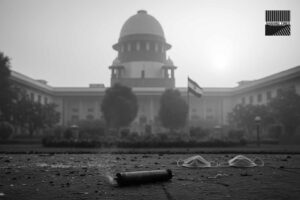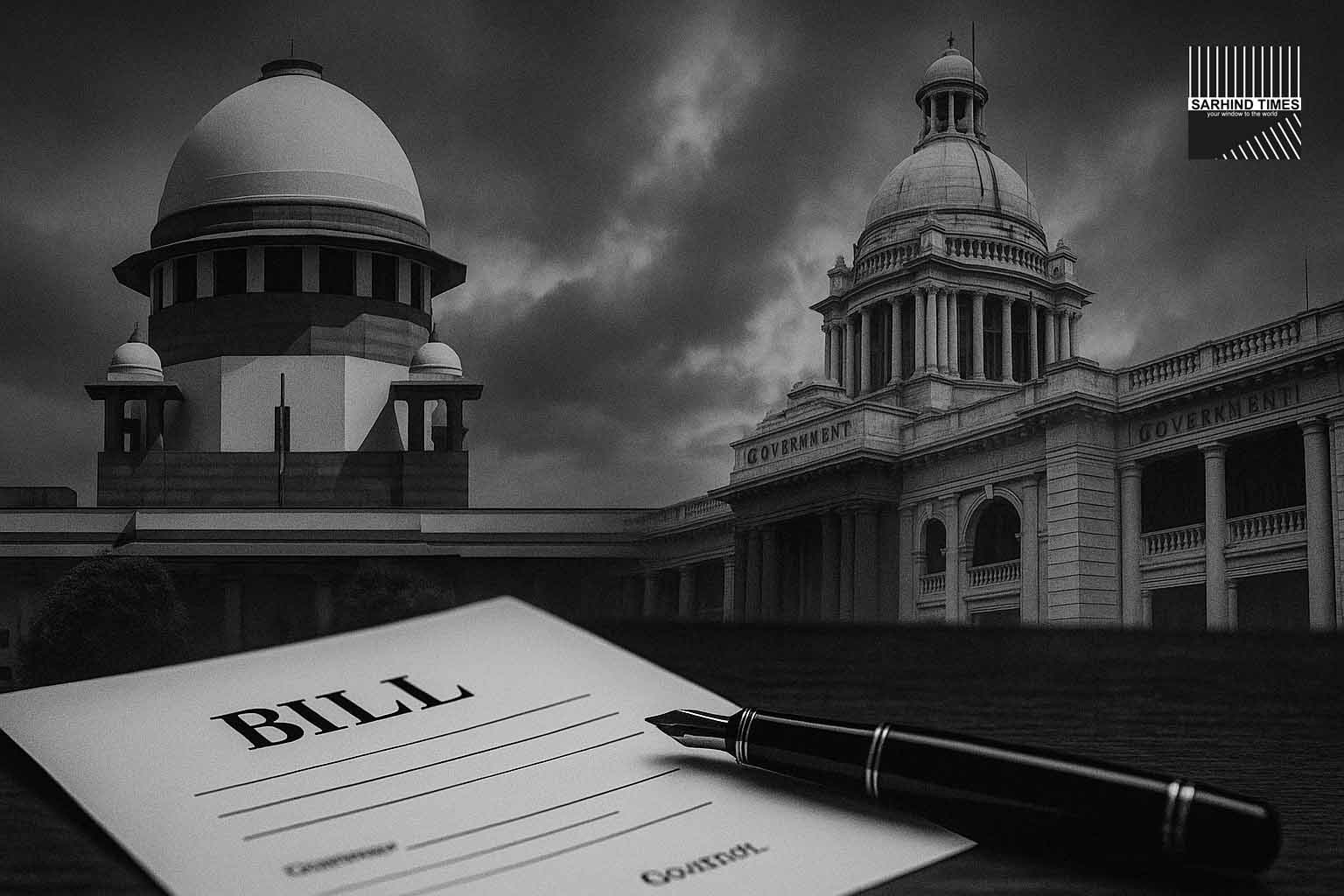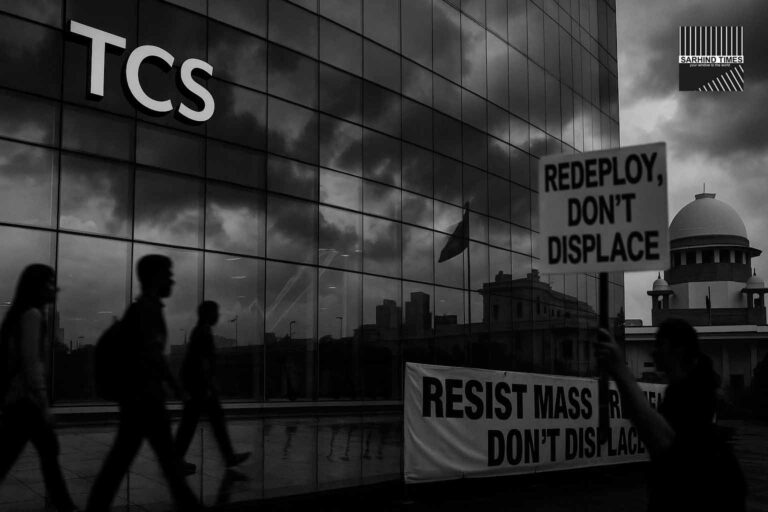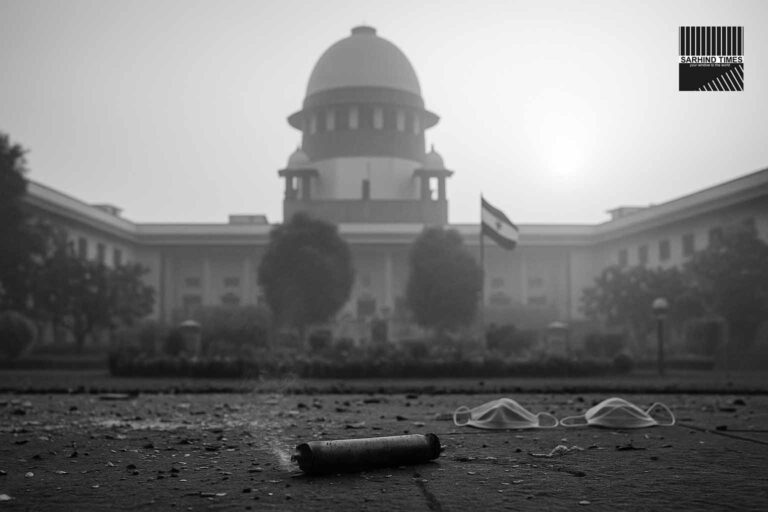State terms Governor RN Ravi’s action unconstitutional; Supreme Court set to examine federal boundaries
(By Sarhind Times Legal & Political Bureau | New Delhi / Chennai | October 16, 2025)
Chennai / New Delhi — Constitutional Tensions Return to the Fore
The ongoing friction between the Tamil Nadu government and Governor R.N. Ravi reached a new legal flashpoint on Wednesday, as the state moved the Supreme Court of India challenging the Governor’s decision to refer a state bill to the President instead of granting assent.
The bill in question — the Tamil Nadu Physical Education and Sports University (Amendment) Bill, 2025 — seeks to modify the composition of the university’s governing council and alter the powers vested in the Chancellor’s office. The Governor’s decision to withhold assent and forward the bill to the President has triggered what the state calls an “unwarranted intrusion into the constitutional domain of the elected legislature.”
In its petition, the Tamil Nadu government described the act as “illegal, unconstitutional, and contrary to the spirit of cooperative federalism.”
Background: The Flashpoint Between Raj Bhavan and Secretariat
Tensions between the DMK-led government and Governor Ravi have simmered for months over pending bills awaiting gubernatorial assent. Chief Minister M.K. Stalin has repeatedly alleged that the Raj Bhavan is “deliberately sitting on bills” passed by the elected Assembly, creating administrative paralysis and undermining democracy.
The current referral follows similar disputes over state university amendments, where the government sought to curtail the Governor’s role as Chancellor and instead vest powers in the Chief Minister or Higher Education Minister.
According to Article 200 of the Constitution, the Governor has three options when presented with a bill:
- Grant assent;
- Withhold assent; or
- Reserve it for the President’s consideration under specific circumstances.
The state argues that this referral does not meet the constitutional threshold for presidential reference — since the bill deals with a state subject (education) and does not contravene any central law.
“The Governor has transformed a routine constitutional process into a political instrument,” the petition alleges. “This undermines the elected legislature and violates the principle of responsible government.”
What the Bill Seeks to Change
The Tamil Nadu Physical Education and Sports University (Amendment) Bill, 2025 seeks to:
- Modify the appointment process of the Vice-Chancellor, giving the state government a decisive role.
- Restructure the University Syndicate and Academic Council to include more representatives from the education department and fewer gubernatorial nominees.
- Clarify financial oversight to align with state audit norms.
The government argues that the changes are administrative, not political, and intended to improve accountability and streamline governance in state universities.
However, the Governor’s office maintains that education, while a state subject, has “interlacing elements of national interest,” warranting scrutiny by the President.
Article 200 and the Constitutional Debate
At the core of the dispute lies Article 200 of the Indian Constitution, which empowers the Governor to either assent to a bill, withhold assent, or reserve it for the President’s consideration.
The Tamil Nadu government’s legal argument rests on two principles:
- The Governor’s power under Article 200 is not absolute; it is bound by constitutional conventions and ministerial advice.
- Referring a state bill to the President must be based on objective criteria, not subjective political discretion.
Legal scholars note that the Supreme Court, in previous judgments such as Shamsher Singh v. State of Punjab (1974) and Nabam Rebia v. Deputy Speaker (2016), has emphasized that Governors must act on the aid and advice of the Council of Ministers, except in situations explicitly defined by the Constitution.
“The Governor is not an alternative centre of power,” said Prof. Faizan Mustafa, constitutional expert and Vice-Chancellor of CNLU Patna. “Referring a bill to the President without legal necessity violates the core principle of responsible government.”
Political Reaction: DMK, Opposition Weigh In
The DMK leadership has framed the Supreme Court move as a defense of state autonomy and federal balance.
“The Governor has repeatedly crossed constitutional boundaries,” said Minister for Law S. Regupathy, addressing reporters in Chennai. “This petition is not about confrontation; it’s about protecting the Constitution.”
Opposition parties in Tamil Nadu, including the AIADMK, have reacted cautiously. While criticizing the DMK for politicizing governance issues, they acknowledged the growing trend of Centre-state friction over gubernatorial roles across India.
The Bharatiya Janata Party (BJP)’s Tamil Nadu unit defended Governor Ravi, stating he acted “in accordance with constitutional norms” and merely sought the President’s view on a matter of “national education policy consistency.”
Centre–State Friction Across India
Tamil Nadu is not alone in confronting gubernatorial interventions. Similar stand-offs have been reported in:
- Kerala, where bills related to university governance were withheld;
- Telangana, where assent delays prompted legal notices; and
- Punjab and West Bengal, where Governors cited constitutional concerns over state policies.
The recurring friction underscores an evolving debate over India’s quasi-federal structure — how much autonomy a state enjoys in policy-making versus the Union’s supervisory powers through appointed Governors.
Political scientists describe this as part of a “constitutional tug-of-war” where Governors, appointed by the Centre, increasingly act as political gatekeepers rather than neutral constitutional heads.
Supreme Court’s Likely Examination
The Supreme Court is expected to take up the Tamil Nadu plea shortly. The bench may examine key questions:
- Can a Governor refer a purely state subject bill to the President without Cabinet advice?
- Does the Constitution permit Governors to delay or deny assent indefinitely?
- Should there be statutory timelines for gubernatorial action on bills?
The answers could have far-reaching implications for Centre–state relations, especially in education, health, and cooperative sectors — all primarily state subjects.
Constitutional watchers expect the court to reiterate that constitutional conventions are not optional but integral to India’s parliamentary democracy.
“This case could become a constitutional landmark,” said Senior Advocate Indira Jaising, speaking to Sarhind Times. “It’s about defining how far a Governor can stretch discretion before it becomes obstruction.”
Federalism Under Stress: The Broader Context
The episode reopens the long-running conversation about federal integrity in India’s political system. While the Constitution describes India as a “Union of States,” the operational balance of power often tilts toward the Centre.
Federalism in India, according to constitutional expert Granville Austin, was designed as “cooperative and flexible” — not competitive or hierarchical. However, in practice, changes in political dynamics have intensified tensions between state governments and centrally appointed Governors.
Education, the domain at the heart of the Tamil Nadu bill, has increasingly become politically charged, with states seeking greater say in curriculum design, university autonomy, and appointment powers — all areas where Governors act as statutory heads.
Possible Outcomes and Implications
If the Supreme Court sides with Tamil Nadu, it could set a precedent limiting gubernatorial discretion and strengthening state legislative supremacy in domestic governance.
Alternatively, if the court upholds the Governor’s referral as constitutional, it might embolden other Raj Bhavans to invoke presidential references more freely — potentially reshaping the balance of legislative power.
Either way, the outcome will redefine the contours of India’s cooperative federalism and clarify how constitutional conventions coexist with legal provisions.
Expert Perspectives
Dr. P.D.T. Achary, former Secretary-General of the Lok Sabha, remarked:
“The Governor’s role is largely ceremonial in the legislative process. Any active intervention must be based on objective constitutional grounds. The Tamil Nadu case could force Parliament to revisit the Governor’s discretionary powers.”
Justice (Retd.) Madan Lokur added:
“This issue is not isolated — it’s symptomatic of a growing trend where constitutional offices are being politicized. The judiciary must reaffirm that the Constitution’s spirit prevails over political expediency.”
What Lies Ahead
The Supreme Court registry is expected to list the matter for preliminary hearing within the next fortnight. Notices are likely to be issued to the Union Government, Raj Bhavan, and the Attorney General for India.
Legal experts predict the Court may issue interim guidelines on gubernatorial timelines — similar to its intervention in Kejriwal v. LG cases concerning Delhi’s administrative powers.
If such directions emerge, they could affect all states, creating a national template for gubernatorial conduct on pending bills.
Conclusion: Constitutional Moment for India’s Federalism
The Tamil Nadu government’s challenge transcends a single bill or political dispute. It touches the foundational principle of parliamentary democracy — whether unelected constitutional heads can override the will of elected legislatures.
As India’s Supreme Court prepares to weigh in, the case could become a touchstone for defining modern Indian federalism — reaffirming that constitutional offices must serve, not subvert, the democratic process.
For Tamil Nadu, the petition is as much about governance as it is about identity — the assertion that the voice of the Assembly must not be silenced by unelected authority.
#SupremeCourt #TamilNadu #Governor #Federalism #Constitution #Education #Law #IndiaPolitics #RNRavi #MKS Stalin #StateAutonomy #Judiciary #RajBhavan

























+ There are no comments
Add yours